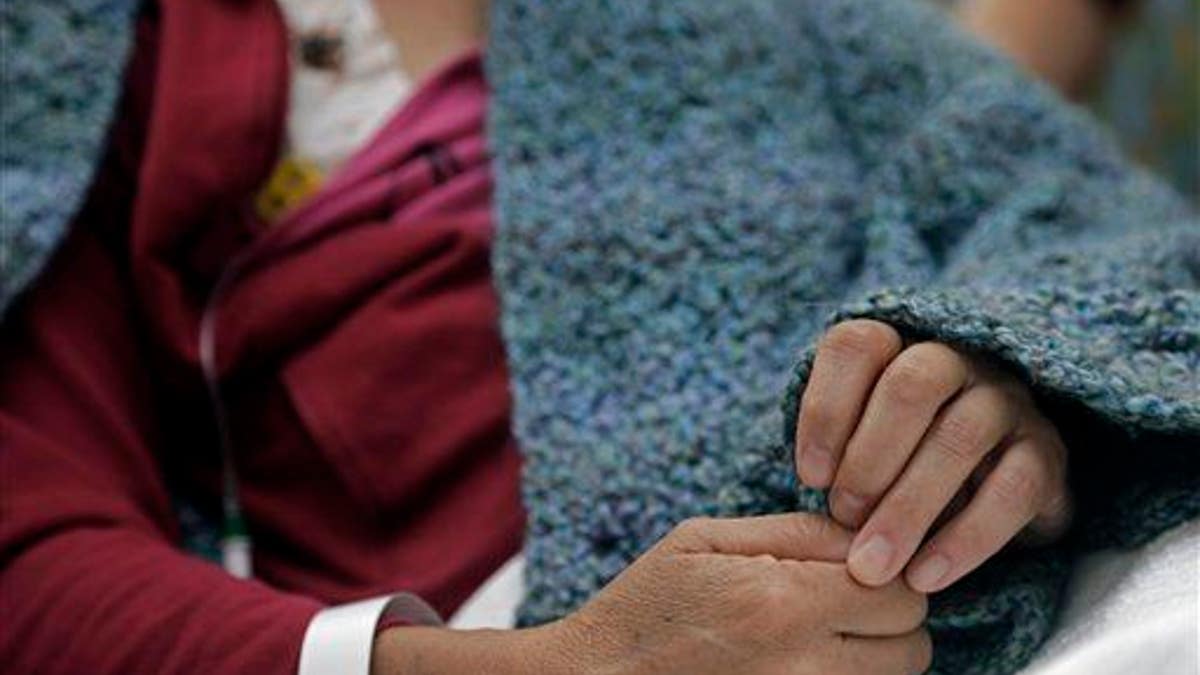World Cancer Day: A cancer survivor's story
Breast cancer survivor Samantha Harris shows 'Fox & Friends' hosts yoga poses.
Pancreatic cancer rates are rising faster among women than men, according to a new study by researchers from Cedars-Sinai Cancer in Los Angeles, California.
The findings were published recently in the journal Gastroenterology.
Pancreatic cancer rates have been climbing for both genders — but women ages 55 and younger saw a 2.4% higher increase compared to men in the same age group.
Young Black women experienced a 2.23% higher increase than Black men of the same age.
LUNG CANCER MORTALITY, INCIDENCE FELL AHEAD OF COVID-19 PANDEMIC: REPORT
These findings may be surprising, given that the American Cancer Society (ACS) states on its website that the disease is more common in men.
Pancreatic cancer accounts for about 3% of all cancers and 7% of all cancer deaths, per the ACS. It’s estimated that 33,130 men and 30,920 women will be diagnosed this year.

Pancreatic cancer rates are rising faster among women than men, per a new study published recently in the journal Gastroenterology. (iStock)
Researchers analyzed a database of cancer patients — specifically those who received pancreatic cancer diagnoses between 2001 and 2018.
"The mortality rate among women is not improving."
"We can tell that the rate of pancreatic cancer among women is rising rapidly, which calls attention to the need for further research in this area," said Dr. Srinivas Gaddam, lead author of the study and associate director of pancreatic biliary research at Cedars-Sinai, in a Feb. 10 press release published on the hospital’s website.
"There’s a need to understand these trends and to make changes today, so this doesn’t affect women disproportionately in the future."
Fox News Digital reached out to the study's lead authors for comment.

"We can tell that the rate of pancreatic cancer among women is rising rapidly, which calls attention to the need for further research in this area," the study author said. (AP Photo/Gerry Broome)
Dr. Michael Chuong, medical director of proton and photon therapy with Miami Cancer Institute in South Florida, was not involved in the study but was not surprised by its results.
"It has been known that the incidence of new pancreatic cancer diagnoses is increasing, and this study further adds to the understanding that this likely will continue for the foreseeable future, thus highlighting the importance of developing novel diagnostic and therapeutic approaches to this deadly disease," he told Fox News Digital via email.

The American Cancer Society says smoking is one of the biggest risk factors for pancreatic cancer. (iStock)
"While we’re reporting improving survival in pancreatic cancer each year, that improvement is largely among men," Dr. Gaddam said in the press release.
"The mortality rate among women is not improving."
WOMEN MORE LIKELY TO SUFFER FROM ‘LONG COVID,’ BUT HEALTHY HABITS CAN LOWER THE RISK
The increase in female pancreatic cancer rates is still relatively small, yet it does highlight the need for awareness and prevention through healthy behaviors.
Dr. Gaddam plans to continue researching pancreatic cancer trends to better understand the differing impacts on men and women, according to the press release.
Why are women more at risk?
The study did not pinpoint a clear reason for the increase in women’s diagnoses. However, researchers suggested a potential cause: a higher frequency of an aggressive type of tumor called pancreatic head adenocarcinoma, which has a low survival rate.

Pancreatic cancer accounts for around 3% of all cancers and 7% of all cancer deaths, per the American Cancer Society. (iStock)
Dr. Dung Trinh, chief medical officer of Irvine Clinical Research and a physician with Memorial Care Medical Group in California, cited several possible reasons for pancreatic cancer rates rising in younger women.
"One potential factor is the increasing prevalence of obesity and type 2 diabetes, as both conditions have been linked to an increased risk of pancreatic cancer," he told Fox News Digital in an email.
"Poor dietary habits, such as a diet high in red meat, processed foods and saturated fats, may also contribute to this trend."
Obesity and type 2 diabetes have both been linked to an increased risk of pancreatic cancer.
Additionally, Dr. Trinh said there is evidence that exposure to certain environmental toxins and chemicals may increase the risk of developing pancreatic cancer.
"For example, exposure to pesticides or other chemicals used in agriculture or industry has been associated with an increased risk of pancreatic cancer," he said.
STUDY SUGGESTS ALCOHOL AND SMOKING CAUSE ALMOST HALF OF GLOBAL CANCER DEATHS
Dr. Trinh also said some studies suggest women who smoke cigarettes or use oral contraceptives for extended periods of time may have a higher risk of developing pancreatic cancer.
Healthy lifestyle a key to prevention
Experts agree that healthy lifestyle choices are the biggest weapons against pancreatic cancer risk.
"Obesity has been linked to an increased risk of pancreatic cancer, so maintaining a healthy weight through regular exercise and a balanced diet is important," said Dr. Trinh.
CLICK HERE TO SIGN UP FOR OUR HEALTH NEWSLETTER
Eating a healthy diet high in fruits, vegetables, whole grains and lean proteins, with lower amounts of red meat and saturated fats, is also important, he said.

Experts agree that healthy lifestyle choices, including getting regular exercise, are the biggest weapons against pancreatic cancer risk. (iStock)
Abstaining from or quitting smoking is another important way to minimize risk.
The ACS cites smoking as one of the biggest risk factors for pancreatic cancer.
CLICK HERE TO GET THE FOX NEWS APP
"Historically, men have had higher smoking rates than women," said Dr. Trinh.
"As smoking rates have decreased among men, this could explain the improvement in pancreatic cancer incidence."
People with a family history of pancreatic cancer can talk with a doctor about early screening options.




















